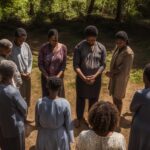Welcome to our article on the prayer ministry job description! In this section, we will delve into the various roles and expectations of a prayer ministry coordinator. If you are curious about what it takes to be part of a prayer ministry or are considering this job role, you’ve come to the right place.
Key Takeaways:
- The prayer ministry coordinator is responsible for integrating prayer into the life of the church.
- Qualifications for this role include a strong personal prayer life, spiritual maturity, and the ability to organize and encourage others in prayer.
- The coordinator identifies individuals interested in intercessory prayer, plans and communicates prayer initiatives, and provides training and resources for prayer ministry.
- The goal of a prayer ministry is to create opportunities for intentional prayer, support other church programs, and deepen the relationship with Christ.
- By fulfilling these roles and responsibilities, the prayer ministry plays a vital role in the spiritual growth and well-being of the church community.
Responsibilities of the Prayer Ministry Coordinator
The prayer ministry coordinator plays a vital role in the church by overseeing various responsibilities related to prayer ministry. Their primary duties include recruiting leaders and volunteers, organizing prayer events, providing training and support, and implementing prayer initiatives. The coordinator also coordinates prayer during worship services, organizes prayer chains, and plans prayer retreats and activities.
Here is a breakdown of the main responsibilities of a prayer ministry coordinator:
- Recruiting Leaders and Volunteers: The coordinator is responsible for identifying and recruiting individuals who are passionate about prayer to serve as leaders and volunteers in the prayer ministry. They ensure that there are enough team members to fulfill the ministry’s goals and objectives.
- Organizing and Leading Regular Prayer Events: The coordinator plans and coordinates regular prayer events such as prayer meetings, prayer vigils, and prayer walks. They lead these events and facilitate an atmosphere of worship and intercession.
- Providing Training and Support: The coordinator equips prayer ministry volunteers with the necessary training and resources to effectively engage in prayer. They provide guidance and support to ensure that volunteers feel equipped and confident in their role.
- Implementing Prayer Initiatives: The coordinator develops and implements prayer initiatives that align with the vision and mission of the church. They create strategic plans and goals to foster a culture of prayer within the congregation.
- Coordinating Prayer During Worship Services: The coordinator works closely with the worship team and pastors to integrate prayer into worship services. They ensure that prayer is given a prominent place in the church’s corporate gatherings.
- Organizing Prayer Chains: The coordinator establishes prayer chains to mobilize the church community in praying for specific needs and requests. They coordinate the communication and distribution of prayer requests among the prayer chain participants.
- Planning Prayer Retreats and Activities: The coordinator organizes prayer retreats and activities that provide opportunities for the church members to deepen their prayer lives and grow in their relationship with God.
The prayer ministry coordinator plays a crucial role in fostering a culture of prayer within the church community. Their responsibilities encompass recruitment, organization, leadership, and support, all aimed at creating an environment where prayer is valued, encouraged, and practiced.
Preaching and Teaching
Preaching and teaching are essential aspects of a prayer ministry. Pastors play a crucial role in studying the Bible, preparing sermons, and delivering them in a way that resonates with the congregation. They serve as examples to others and provide spiritual guidance through individual counseling and leading Bible study groups. Additionally, they may lead youth retreats and provide resources for members to enhance their understanding of the scriptures. The objective of preaching and teaching in a prayer ministry is to spread the word of God, offer guidance to those seeking spiritual support, and create opportunities for personal growth and learning.
“The greatest legacy one can pass on to one’s children and grandchildren is not money or other material things accumulated in one’s life, but rather a legacy of character and faith.” – Billy Graham
Through their preaching and teaching, pastors help followers deepen their relationship with God, gain a deeper understanding of biblical principles, and navigate life’s challenges with faith and resilience. They provide a platform for individuals to engage in meaningful discussions, ask questions, and support one another on their spiritual journeys. By addressing relevant topics and sharing personal experiences, pastors can connect with the congregation on a deeper level, fostering a sense of belonging and community within the prayer ministry.
The Power of Prayer in Preaching and Teaching
Integrating prayer into preaching and teaching is vital for a prayer ministry. Pastors encourage and model a culture of prayer by seeking God’s guidance before delivering sermons and leading discussions. They emphasize the importance of prayer in seeking wisdom and understanding from God’s Word. By incorporating prayer into preaching and teaching, pastors create an atmosphere of spiritual connection and provide opportunities for congregants to experience the transformative power of prayer firsthand.
Prayer is not only a means of communication with God but also a way to deepen our relationship with Him and strengthen our faith. As pastors engage in prayer alongside their congregation, they demonstrate vulnerability, reliance on God, and an active belief in the power of prayer. Through prayer, the preaching and teaching in a prayer ministry become more than mere intellectual exercises; they become transformative experiences that bring individuals closer to God and His purposes for their lives.
Performing Rites and Holding Services
The prayer ministry plays a crucial role in the spiritual life of the church community by performing various rites and holding meaningful services. These activities provide a platform for members to engage in worship, seek spiritual guidance, and find comfort and support during significant life events.
One of the primary responsibilities of the prayer ministry is to perform sacraments such as baptisms, confirmations, and marriages. These sacred rituals symbolize the faith journey, commitment, and union of individuals within the church. By conducting these rites, the prayer ministry helps strengthen the spiritual bond among church members and fosters a sense of belonging and community.
In addition to performing rites, the prayer ministry also plays a vital role in holding services throughout the liturgical year. This includes special services for holy days, Advent, and Lent. These worship gatherings provide opportunities for congregants to come together, express their devotion, and deepen their relationship with God. The prayer ministry ensures that these services are well-organized, spiritually enriching, and reflective of the church’s mission and values.
| Service | Date | Time | Location |
|---|---|---|---|
| Christmas Eve Service | December 24th | 7:00 PM | Main Sanctuary |
| Good Friday Service | April 2nd | 12:00 PM | Main Sanctuary |
| Easter Sunday Service | April 4th | 9:00 AM | Main Sanctuary |
Through performing rites and holding services, the prayer ministry creates a sacred space where individuals can experience God’s presence, find solace in times of celebration and grief, and grow in their faith journey. This aspect of the prayer ministry contributes to the overall spiritual well-being of the church community.
Overseeing Administrative Functions
Within the prayer ministry, the role of the coordinator extends beyond spiritual guidance and event planning. They also take on important administrative functions to ensure the smooth operation of the ministry and support the overall mission of the church.
As the senior leader of the church, the prayer ministry coordinator assumes responsibilities such as overseeing business operations, maintaining the church facility, and adhering to the constitution and by-laws of the church. This includes making personnel decisions, scheduling meetings with church leaders, and handling correspondence.
Additionally, the coordinator plays a key role in approving expenditures and contributing to church publications. By efficiently managing administrative tasks, the coordinator enables the prayer ministry to focus on its core objective of integrating prayer into the life of the church.
To provide a visually engaging overview of the administrative functions, here is a table summarizing the key responsibilities:
| Administrative Functions | Responsibilities |
|---|---|
| Overseeing Business Operations | – Ensure compliance with legal regulations – Manage financial transactions – Maintain records and reports – Implement systems and processes for efficient operation |
| Maintaining Church Facility | – Oversee the maintenance and cleanliness of the church building – Coordinate repairs and renovations – Ensure a safe and welcoming environment for worshippers |
| Following Church Constitution and By-laws | – Familiarize oneself with the church’s governing documents – Ensure adherence to the established guidelines – Facilitate necessary amendments when needed |
| Making Personnel Decisions | – Recruit, train, and manage staff members – Evaluate performance and provide feedback – Foster a positive work environment |
| Scheduling Meetings | – Coordinate and schedule meetings with church leaders – Prepare agendas and minutes – Facilitate effective communication and decision-making |
| Handling Correspondence | – Respond to emails and letters – Manage phone calls and inquiries – Maintain effective communication with members and stakeholders |
By effectively overseeing these administrative functions, the prayer ministry coordinator ensures that the operations run smoothly, allowing the ministry to focus on its primary mission of deepening the relationship with Christ through prayer.

Conclusion
The prayer ministry job requires individuals with a strong personal prayer life, spiritual maturity, and leadership skills. It is essential for the prayer ministry coordinator to have a clear understanding of the job requirements and to effectively communicate the expectations to potential candidates.
A prayer ministry job description template can be a useful tool to outline the roles and responsibilities of the position. This template should include qualifications, such as a deep prayer life, spiritual maturity, and the ability to organize and encourage others in prayer. It should also outline specific tasks, such as recruiting leaders and volunteers, planning prayer initiatives, and providing training and support.
By fulfilling these roles and responsibilities, the prayer ministry can support the spiritual growth and well-being of the church community. The prayer ministry coordinator plays a vital role in integrating prayer into the life of the church and providing opportunities for members to deepen their relationship with Christ through prayer. With a clear mission, goals, and objectives, the prayer ministry can have a significant impact on the overall mission of the church.
FAQ
What are the qualifications for a prayer ministry coordinator?
Qualifications for a prayer ministry coordinator include a strong personal prayer life, spiritual maturity, and the ability to organize and encourage others in prayer.
What are the responsibilities of a prayer ministry coordinator?
The responsibilities of a prayer ministry coordinator include identifying individuals interested in intercessory prayer, planning and communicating prayer initiatives, providing training and resources for prayer ministry, recruiting leaders and volunteers, organizing and leading regular prayer events, implementing plans for prayer partners or individuals committed to daily prayer, and coordinating prayer during worship services.
What is the goal of a prayer ministry?
The goal of a prayer ministry is to create opportunities for intentional prayer, support other church programs, and deepen the relationship with Christ.
What are the core responsibilities of preachers and teachers in a prayer ministry?
The core responsibilities of preachers and teachers in a prayer ministry are to study the Bible, prepare relevant sermons, lead by example, provide spiritual guidance through counseling and Bible study groups, spread the word of God, guide followers seeking spiritual guidance, and provide opportunities for growth and learning.
What are the pastoral responsibilities in a prayer ministry?
The pastoral responsibilities in a prayer ministry include performing baptisms, confirmations, and marriages, providing spiritual support for the sick and their families, offering prayers and comfort during times of loss, and holding worship services throughout the liturgical year.
What administrative tasks are involved in the role of a prayer ministry coordinator?
Administrative tasks in the role of a prayer ministry coordinator may include overseeing business operations, maintaining the church facility, following the church’s constitution and by-laws, making personnel decisions, scheduling meetings with church leaders, handling correspondence, approving expenditures, and contributing to church publications.
What are the requirements for a prayer ministry job?
The prayer ministry job requires individuals with a strong personal prayer life, spiritual maturity, leadership skills, and a clear mission statement, goals, and objectives for the prayer ministry.








